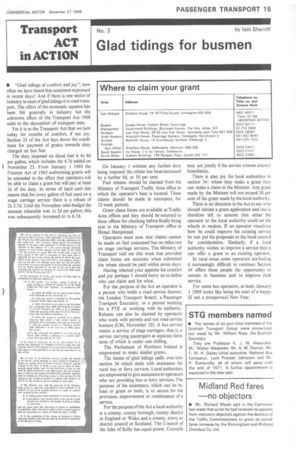Glad tidings for busmen
Page 17

If you've noticed an error in this article please click here to report it so we can fix it.
On January 1 without any further duty being imposed the rebate has been increased by a further 9d, or 50 per cent.
Fuel rebates should be claimed from the Ministry of Transport Traffic Area office in which the operator's base is located. These claims should be made in retrospect, for 12-week periods.
Grant claim forms are available at Traffic Area offices and they should be returned to these offices for checking before finally being sent to the Ministry of Transport office at Hemel Hempstead.
Operators must note that claims cannot be made on fuel consumed but on miles run on stage carriage services. The Ministry of Transport told me this week that provided claim forms are accurate when submitted the rebate should be paid within seven days.
Having whetted your appetite for comfort and joy perhaps 1 should hurry on to define who can claim and for what.
For •the purpose of the Act an operator is a person who holds a 'toad service licence; the London Transport Board; a Passenger Transport Executive; or a person working for a PTE or working with its authority. Rebates can also be claimed by operators who work with permits and not road service licences (CM, November 29). A bus service means a service of stage carriages; that is, a service carrying passengers at separate fares none ,of which is under one shilling.
The Parliament of Northern Ireland is empowered to make similar grants.
The theme of glad tidings spills over into section 34 which deals with assistance for rural bus or ferry services. Local authorities are empowered to give assistance to operators who are providing bus or ferry services. The purpose of the assistance, which can be by loan or grant or both, is to secure for the provision, improvement or continuance of a service.
For the purpose of the Act a local authority is a county, county borough, county district , in England or Wales and a county, town, or district council in Scotland. The Council of the Isles of Scilly has equal power. Councils may act jointly if the service crosses council boundaries.
There is also joy for local authorities in section 34: where they make a grant they can make a claim to the Minister. Any grant made by the Minister will not exceed 50 per cent of the grant made by the local authority.
There is no direction in the Act to say who should initiate a grant application and one is therefore left to assume that either the operator or the local authority could set the wheels in motion. If an operator visualizes how he could improve his existing service he can put his proposals to the local Council For consideration. Similarly, if a local authority wishes to improve a service then it can offer a grant to an existing operator.
In rural areas some operators are finding it increasingly difficult to continue. Section 34 offers these people the opportunity to remain in business and to improve their service.
For some bus operators, at least, January 1 1969 looks like being the start of a happy (if not a prosperous) New Year.












































































